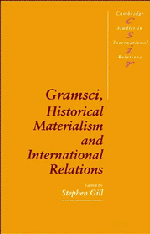Book contents
- Frontmatter
- Contents
- Notes on contributors
- Acknowledgements
- Gramsci and global politics: towards a post-hegemonic research agenda
- PART I PHILOSOPHICAL AND THEORETICAL REFLECTIONS
- 1 Epistemology, ontology, and the ‘Italian School’
- 2 Gramsci, hegemony and international relations: an essay in method
- 3 Alienation, capitalism and the inter-state system: toward a Marxian/Gramscian critique
- 4 Global hegemony and the structural power of capital
- PART II PAST, PRESENT AND FUTURE
- References
- Index
- Titles in the series
1 - Epistemology, ontology, and the ‘Italian School’
Published online by Cambridge University Press: 10 January 2011
- Frontmatter
- Contents
- Notes on contributors
- Acknowledgements
- Gramsci and global politics: towards a post-hegemonic research agenda
- PART I PHILOSOPHICAL AND THEORETICAL REFLECTIONS
- 1 Epistemology, ontology, and the ‘Italian School’
- 2 Gramsci, hegemony and international relations: an essay in method
- 3 Alienation, capitalism and the inter-state system: toward a Marxian/Gramscian critique
- 4 Global hegemony and the structural power of capital
- PART II PAST, PRESENT AND FUTURE
- References
- Index
- Titles in the series
Summary
This chapter should be read in conjunction with the introduction to this volume. The term ‘Italian School’ was coined by an anonymous reviewer. The objective of this chapter is to raise a number of epistemological, ontological and practical questions which seem to me to be germane to the chapters which follow and which may be useful in helping to promote theoretical development in this broad field of study. Central to this discussion will be Gramsci's distinction between historical materialism and historical economism, and the attempt to move towards a more historicist, reflexive and dynamic form of political economy explanation.
The approach of this chapter assumes that the central task of social science is to explain social action, social structure and social change. Further, with respect to epistemological questions, it assumes that ‘there is no symmetry between the social and natural sciences with regard to concept formation and the logic of inquiry and explanation’ (Gunnell, 1969: 168). A further assumption is that there is not, and logically can not be, a single language of scientific explanation. The key contrast between social science and natural science is that the structure of social relationships and the meaning of social events are not principally functions of the scientist's theory, since what the social scientist confronts is ‘not a first but a second-order reality’. The ‘world’ of the social scientist is a second-order one because it has been logically pre-ordered by its participants, ‘in whose terms action is conducted and is justified’.
- Type
- Chapter
- Information
- Publisher: Cambridge University PressPrint publication year: 1993
- 45
- Cited by



